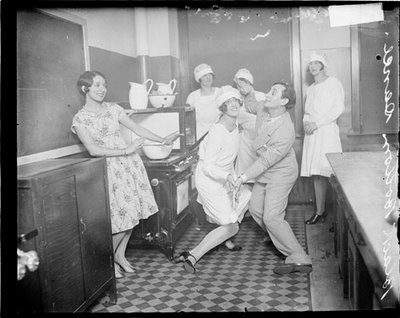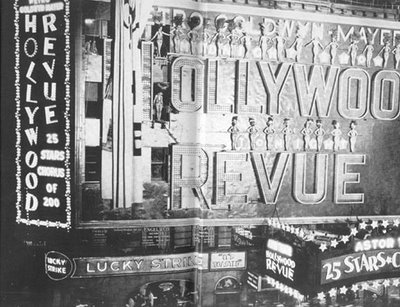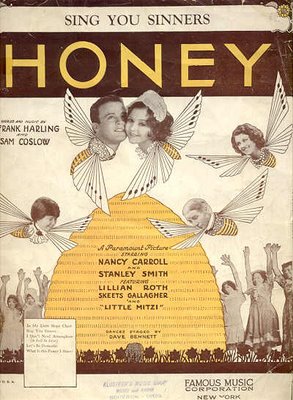
For an American enthusiast and collector of popular music circa 1900-1935 such as myself, a point is invariably reached where you deem you've "heard it all," or at least every new vintage disc or cylinder you encounter seems --- if not an old familiar friend, then at least a vaguely remembered acquaintance.
Providing a much needed diversion then, comes music from a distant shore --- the United Kingdom, to be precise. The melodies may be familiar, but the labels they're recorded on aren't --- and neither are the names of the recording artists. In an odd way, it's not unlike encountering an unknown alternate universe of sorts, with each disc about to be spun containing the prospect of a pleasant surprise.
To be fair, when all is said and done, the pleasant surprises weren't as frequent nor memorable as hoped for, but amidst all the dusty shellac lurk gems. Then too, there's an almost indescribable inherent difference in British jazz from the American counterparts of the period. A combination of difference in recording technique (UK jazz of the period always sounds like it was recorded in an echo heavy cathedral) and, certainly in performance style. No matter how hot and low-down the tune, it seems to have been played by musicians clad in tuxedos with crisp wing-tip collars who never perspire or utter an oath. Of course, I'm sure that such wasn't the case --- now, then or ever --- but there's a peculiar element of dignified reserve involved that I find irresistibly charming, evocative and beautifully effective.
First up, is "Da-Dn-Da" from 1930, recorded by "The Ever Bright Boys" (an alternate name for Percival MacKay's band) on the Piccadilly label. Absolutely joyous nonsense, this --- all about love hungry males (advised to "catch 'em young and treat 'em rough!") and reluctant females, with an incredibly focused and wonderfully lunatic vocal that you won't soon forget!
"Da-Dn Da" (1930)
We next move ahead to 1931 and "The Peanut Vendor," with a then still exotic and slightly risque Cuban rhythm that made it irresistible to listeners and dancers alike. Widely recorded and highlighted in the 1931 Metro film "The Cuban Love Song," it's performed here by the Marius B. Winter band (again on the "Broadcast" label) with verve and caliente enthusiasm aplenty.
"The Peanut Vendor" (1931)

From the first wave of screen musicals that arrived in 1929, comes "Low Down Rhythm" from MGM's mammoth all-star screen vaudeville, "The Hollywood Revue." As presented in the film, the tune served to first conjure up the fondly recalled music of the past and then to present a natural musical progression of sorts to this new rhythm of jazz, indicating it needed to be "taken up to the skies" and introduced to an undoubtedly unimpressed Saint Peter at the heavenly gate. Of all the many, many renditions of the tune recorded in 1929 and 1930 (the tune would even turn up in the 1933 Jean Harlow film "Bombshell",) I like this version the best --- with a violin sweetly swirling all about the tricky syncopated rhythm, and a charming vocalist who sounds as though he'd rather be singing "Annie Laurie." A gem.
"Low Down Rhythm" (1930)
From 1928, a real oddity --- the details of which are unknown to me, except that for some wonderful reason, four noted British jazz bands combined their skill (and musicians) under one roof to record "Bless Her Little Heart," and nearly succeeded in blowing that said roof off! Indeed, the grooves of the record can barely contain the sound! The tune itself isn't exceptional --- but there's an almost overwhelming musical tidal wave on display here that seems as though could have been heard for blocks and blocks away from wherever it was recorded. Imagine having been there. So then, here are the combined bands of Debroy Somers, the Piccadilly Revels, the Kit Kat Band and the London Radio Band with "Bless Her Little Heart," under the direction of one Mr. Al Starita.
"Bless Her Little Heart" (1928)
 The marvelous 1930 Paramount film "Honey" ("A Musical Farce") survives today in a never-never land of limbo, with litigation and ignorance holding it under lock and key --- but when seen it offers an incredible abundance of pleasures, chief among them the performances of Nancy Carroll, Skeets Gallagher, Lillian Roth, ZaSu Pitts and Mitzi Green. And then, among the tuneful moments, there's the hell raising "Sing You Sinners" which comes out of nowhere and raises the film to gleeful levels that can't easily be described. Harry Hudson and his Orchestra, recording here as "The Blue Jays" for the "Radio" 78rpm label, give fair indication of what I mean:
The marvelous 1930 Paramount film "Honey" ("A Musical Farce") survives today in a never-never land of limbo, with litigation and ignorance holding it under lock and key --- but when seen it offers an incredible abundance of pleasures, chief among them the performances of Nancy Carroll, Skeets Gallagher, Lillian Roth, ZaSu Pitts and Mitzi Green. And then, among the tuneful moments, there's the hell raising "Sing You Sinners" which comes out of nowhere and raises the film to gleeful levels that can't easily be described. Harry Hudson and his Orchestra, recording here as "The Blue Jays" for the "Radio" 78rpm label, give fair indication of what I mean:"Sing You Sinners" (1930)
I'll close this installment (of which there will be sequels, I'm sure) with what I consider to be the ultimate British recording of the period. Titled "You Are My Heart's Delight" --- a reworking of the classic Franz Lehar melody --- the tune serves here as a backdrop to introduce The Savoy Hotel Orpheans, an ensemble that personifies elegance on top of more elegance.. Each musician is introduced, along with their instrumental contribution as they join in with the melody, by announcer Norman Long and the effect is so lovely and unusual that it's bound to raise the hairs on the back of the neck of more sensitive (or sentimental) listeners, of which I consider myself unduly both. It was recorded for Columbia UK.
"You Are My Hearts Delight" (1931)
Photographs from the Chicago Daily News Courtesy of the Chicago Historical Society (#DN-0081644 and #DN-0078352)
###

1 comment:
I was lucky enough to see it at the Museum of Modern Art (NY) a number of years ago, in a beautiful 35mm print so pristine and shimmering as to cause gasps when first flashed on the screen.
How sad then, that this and other Paramount gems of the period, languish in vaults --- held captive, in every sense of the term.
Jeff
Post a Comment